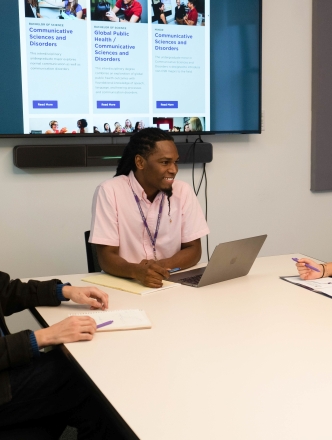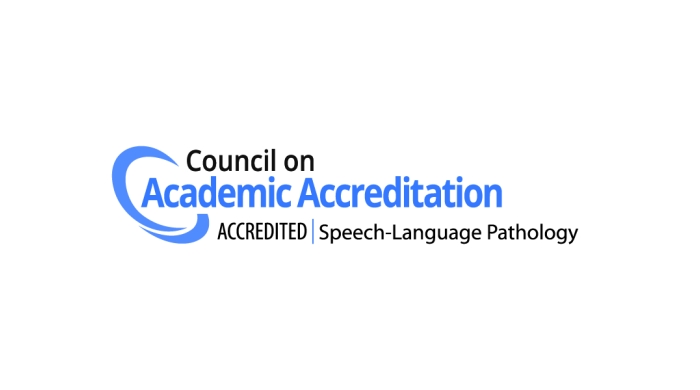
Our 48-credit on-campus program of study provides a broad-based and comprehensive education in both the theoretical and practical aspects of communicative sciences and disorders (CSD). Courses and field work are designed to achieve the integration of academic and clinical experiences and include supervised clinical experiences to help you gain the necessary skills for culturally responsive evaluation, intervention, and interaction for entry into professional practice as a speech-language pathologist.
The on-campus MS in Communicative Sciences and Disorders includes enrollment across Fall, Spring, and Summer terms. This consecutive sequence provides a continuous and immersive learning experience
Core Course Sequence
Our rigorous program of study centers culturally and linguistically responsive practices in order to teach you methods of prevention, assessment, and intervention for people with communication and swallowing disorders, as well as how to integrate research principles into evidence-based clinical practice.
You will take courses in the following categories:
- Instrumentation and Research Courses
- Disorder and Practice Courses
- Departmental and Certification Courses
- Clinical Courses
You’ll also complete a supervised practicum sequence, where you’ll gain experience with individuals across the lifespan and from culturally/linguistically diverse backgrounds. The practicum sequence will include experience with populations with various severities of communication and/or related disorders, differences, and disabilities.
Students who do not have a bachelor's in CSD or a related field take additional foundational courses to acquire the necessary base knowledge prior to beginning graduate-level study. Many undergraduates come to our program from diverse academic backgrounds such as psychology, linguistics, theater, world language, and more.
Specialization Sequence
If you are bilingual or multilingual and you wish to pursue your Bilingual Extension of the Teacher of Students with Speech and Language certification (TSSLD) in New York State, you also have the option of applying to the Bilingual Extension Track, which provides supplemental training focused on linguistically responsive and sustaining methods of assessment and instruction for children ages 3–21 years who communicate in more than one language and/or a language other than English. For more information on the application process and criteria, interested students should review the Bilingual Extension page.
For Students in the Residential Modality
The first three semesters of clinical education are completed in the on-campus clinic. The first practicum semester includes an experiential component at a community partnership and emergent diagnostics with a clinical simulation. The second practicum further focuses on the clinical diagnostic processes with members from the community and may also include providing intervention and/or services in the NYU CSD Speech, Language, and Hearing Clinic. The third practicum semester focuses on providing treatment and services with a full caseload in the clinic. All three practicum semesters also include opportunities to work in community partnerships and initiatives in the surrounding metro NY area Following the successful completion of the on-campus practicum in the NYU CSD Speech-Language-Hearing Clinic, students are placed off campus for two semesters in Practicum IV and V. Off-campus field placement schedules vary, with many being full-time, with scheduling details at the discretion of the site supervisor. The field placement semesters are considered full-time commitments.
Sample Elective Courses
We offer a number of elective courses to complement your interests; some examples include:
- Augmentative and Alternative Communication
- Therapeutic Procedures in CSD: Aphasia
- Therapeutic Procedures in CSD: Advanced Voice Disorders
- Language and Communication in Autism
- Neurogenic Speech Disorders in Children
- Speech and Swallowing Management for the Medically Complex Child
- Counseling Skills for Communicative Sciences and Disorders
- Craniofacial Anomalies
Culminating Experience
To complete the Master of Science degree, you may write a paper reflecting on how you incorporated research into your clinical experience or elect to complete a master’s thesis. The master’s thesis options allows you to produce a scholarly paper in scientific format by joining a research lab or developing a project with your research mentor.
Additional Opportunities
Additional curricular opportunities include study abroad programming. Study abroad opportunities are subject to change, but previous sites include Lund, Sweden and Accra, Ghana.
Additional ASHA Course Requirements
In addition to the courses listed above, the American Speech-Language-Hearing Association (ASHA) requires you to have transcript credit (which could include course work, Advanced Placement, College Level Examination Program [CLEP], or examination of equivalency) for each of the following areas: human/animal biological science, physical science, social/behavioral science, and statistics. You must earn a grade of C or better in each of these courses to be considered by NYU.
These courses can be completed within one year of beginning the program and do not count toward graduate credit for the master’s degree. In addition to transcript credit, you may be required to provide further evidence of meeting this requirement.
Take the Next Step
Advance your personal and professional journey – apply to join our community of students.
Apply Now
